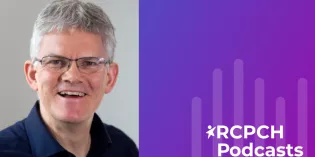This page is for those exploring, applying to or already in this sub-specialty training programme! We have insights from current specialists on what it's like working in paediatric oncology, opportunities to try out the sub-specialty and links to the relevant groups and other contacts.
Each sub-specialty has its own syllabus as part of Progress+ which you can download from this page, plus get details of the College Specialty Advisory Committee (CSAC) managing this sub-specialty.
1. What makes a paediatric oncologist?
A paediatric oncologist cares for children and young people and their families at all stages of cancer treatment, from diagnosis to long-term follow-up or palliative care, and often maintains support for many years. The cancer may be in any location or system, including the blood (leukaemia), brain or body.
Paediatric oncologists work closely with haematologists, surgeons, radiation oncologists, pathologists, radiologists, endocrinologists, and other oncologists, nationally and internationally, to ensure therapies are appropriate and effective. They work locally with psychologists, social workers and teachers to support patients and their families, ensuring that the burden of treatment is contained and that the long-term effects of treatment are minimised.
Evidence-based medicine is at the core of paediatric oncology, with the expectation that patients will be treated according to clinical trials whenever possible. It is an exciting and rapidly advancing field, and a commitment to life-long learning is essential to work in this fascinating and rewarding specialty.
Paediatric oncology is a varied, intellectually challenging, emotive and incredibly rewarding sub-specialty.
2. A day in the life of a paediatric oncologist
By Dr Ren Manias, Consultant Paediatric Oncologist in Southampton
"I was drawn towards oncology as a sub-specialty quite early in my paediatric training, and realised I had found my niche when I began a placement in oncology at Birmingham Children’s Hospital. I subsequently applied for sub-specialty training, completed a PhD along the way, and was appointed as a Consultant with an interest in NeuroOncology in 2022.
"I genuinely look forward to going to work every day – each day brings different challenges and there is always something new to learn. I love having the opportunity to form lifelong relationships with children and families as you guide them along their cancer journey, which is incredibly rewarding on a personal level. You get to know them really well as you help them through challenging times, and it is a privilege to work with such brave and inspiring people.
"Oncology involves a lot of multidisciplinary work with other specialities, such as surgeons, neurologists, endocrinologists, renal and infectious diseases doctors, radiologists etc. We also work closely with other members of the healthcare team, like clinical nurse specialists, psychologists, dieticians, radiotherapists and physiotherapists.
"There are lots of opportunities for research – you could be a clinical academic, do basic or translational research, or lead clinical trials. Even if you don’t want an academic career, everyone is involved in the orchestration of clinical trials to a greater or lesser extent (as a Principal Investigator or simply through recruitment, consent etc) as the field of oncology is very research-driven.
"It can be very sad when things don’t go as we would like. Children do die, and these are children we care about very much. It’s really important to develop robust methods of self-care to help you to manage this. We are very fortunate where I work to have access to psychology and clinical supervision, but we also support one another as members of the healthcare team and make sure we take care of anyone who looks like they’re struggling.
"Maintaining a healthy work-life balance is really important when working in an intense and emotionally charged specialty - you need to make time for your family, friends and hobbies outside work. I counter-balance my career with a fun but busy home life. It’s crucial to maintain the parts of life that make you ‘you’, to eat properly, exercise, sleep well and build good social support networks so you can be the best version of yourself for the people and patients you care about."
3. How and where to experience paediatric oncology in your early medical career
If you have an interest in paediatric oncology we invite you to join the Paediatric Oncology Trainees’ Group (POTG), which will send you information about educational opportunities and meetings which will help you gain exposure to the speciality. This will allow you to meet other trainees and senior clinicians with a shared interest who could help guide and advise you.
Children and young people with cancer are usually treated in Tertiary Primary Treatment Centres (PTCs), although some receive shared care in smaller hospitals which act as Paediatric Oncology Shared Care Centres (POSCUs). It may be possible to request a specific placement in paediatric oncology during your training. You may also be able to care for oncology patients whilst undertaking placements in general paediatrics, or at the time of presentation if they are referred by a GP or attend ED acutely unwell. There may also be opportunities to experience the academic side of paediatric oncology through becoming involved in research or clinical trials.
4. Applying to a paediatric oncology programme
Successful applicants for paediatric oncology training have insight into the sub-specialty, with evidence of a commitment to oncology, excellent communication skills, and an understanding of research, teaching and quality improvement. It is not essential to have extensive oncology experience at the time of application, but you should be able to demonstrate a sustained interest and a good understanding of what the sub-specialty involves. Undertaking audits, quality improvement projects or research in oncology can be helpful, as can evidence of having attended relevant meetings or additional education sessions.
Other attributes of a good paediatric oncologist include empathy, the ability to work well in a team, excellent attention to detail, and a commitment to life-long learning and evidence-based medicine. As a paediatric oncologist, you will form long relationships with children and their families as you guide them through their cancer journey, which necessitates a high level of emotional intelligence, kindness and compassion. The ability to maintain a good work-life balance is also incredibly important given the emotionally challenging nature of this sub-specialty.
For trainees who wish to develop expertise in paediatric oncology, whilst pursuing a career in general paediatrics, there is an opportunity to do a SPIN in paediatric oncology. This enables a trainee to develop and evidence skills necessary to work as a general paediatrician with a special interest, in delivering care in a Paediatric Oncology Shared Care Unit (POSCU). SPIN training mandates spending time working in a Paediatric Oncology Principal Treatment Centre (PTC) as well as developing broad POSCU experience in paediatric oncology, haematology, palliative care and service delivery across Operational Delivery Networks (ODNs).
5. Information for paediatric oncology trainees
The Children’s Cancer and Leukaemia Group (CCLG) website has lots of information. You can request to be a CCLG member at any stage of training and are welcome to attend our meetings or educational events.
The Paediatric Oncology Trainees’ Group (POTG) is open for members - email your details to potg@cclg.org.
If you would like to find out more about a career in paediatric oncology or ask for specific advice, the following people would be happy to be contacted:
- Dr Sara Stoneham, CSAC Chair: sara.stoneham@nhs.net
- Dr Ren Manias, CSAC Training Advisor: ren.manias@uhs.nhs.uk
The Oncology CSAC has written an educational supervision guide to help oncology sub-specialty trainees as they enter the training programme, and for supervisors to support their trainees. It explains how oncology training works, incuding sources of support, ePortfolio requirements and educational opportunities. Download the guide below
External links
To find out more about paediatric oncology, the CSAC recommend the following websites as useful resources:










